Trump's Border Wall: An Environmental Catastrophe
The proposed Mexican border wall has been extremely controversial from it's earliest beginnings. While many Americans feel it is a crucial addition to achieve national security, just as many rally against it on the grounds that a wall would be expensive, ineffective, and would more than likely worsen US/Mexican political relationships. Unfortunately, despite endless financial and political arguments, our current administration seems hellbent on seeing this wall erected.
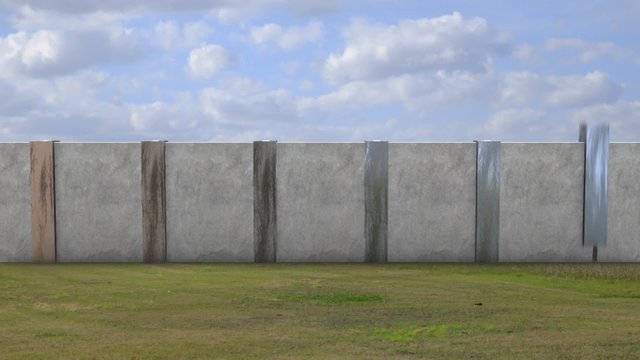
Sadly, it is the environmental impact that is being overlooked (a recurring theme of the administration, it seems). While we fight over the merits of a "bigger, better wall" in terms of human practicality, most people just don't bother to consider the natural impact a wall would have. Much of this comes down to a fundamental misunderstanding of what the US/Mexican border really is; many people are under the impression that everything that is "American" and belongs to the US simply stops at the border, while likewise in Mexico, everything than can be considered Mexican ends as soon as you hit the United States. Following that line of (very inaccurate) thought, a border wall shouldn't be that big a deal, rather it would simply be a physical barrier established between two regions that are already distinctly separated from one another.
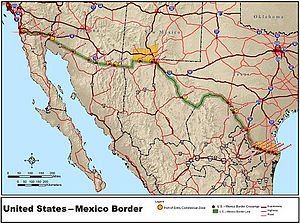
Anyone with environmental experience (or has taken a few science classes) can tell you that isn't how the environment works though. The habitat around the United States/Mexican border is pretty much identical regardless of the side of the border you are on because it is a single ecosystem that has been divided by a man-made border. Animals and plants have no concept of political boundaries, and hundreds of species have ranges that are split between the United States and Mexico. Their survival is often reliant on being able to travel throughout their native range, which would naturally take them back and forth over the border.
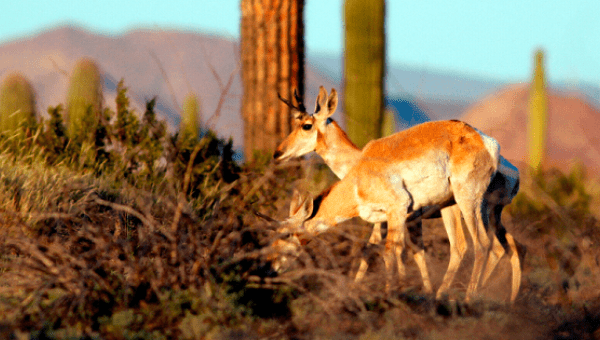
Currently, special nature reserves protected by the governments of both nations allow these species to cross the border (usually through single fences with gaps large enough for animals). But a wall on the Mexican border would completely isolate the two sides, driving a wedge through the entire ecosystem. While animals might not be able to recognize political boundaries and borders, they certainly recognize physical barriers and would be unable to migrate throughout their native range. Ecologists from the Mexican National Autonomous University have revealed in a recent study that such a barrier would negatively impact at least 800 species of wildlife across the 2,000 mile range...over 140 of these species are already at risk of extinction.
“The U.S.-Mexico border is made up of mountains, jungle, coastline and many other diverse ecosystems. Wildlife has populated these regions for millions of years, and has always had freedom of movement to hunt, reproduce and migrate. To make these animals suffer as a result of man’s political agenda is entirely immoral.” -Professor Gerardo Ceballos Source
It still might not seem like a big deal. So what if some populations are stuck on one side, and some on the other, why is that so bad? Shouldn't the populations on either side be able to maintain themselves even if separated? Unfortunately no. By fragmenting their habitat, these animals will be greatly impeded when it comes to reproduction; with fewer individuals, the gene pool will be much shallower and the chances of inbreeding will increase substantially. Ecosystems also face fluctuations in available resources and favorable conditions; (especially in the deserts) they must be able to find food, water and shelter to survive. A border wall would prevent migrations to new areas with abundant resources when conditions are unfavorable. While Mexico makes up just 1 percent of the Earth’s total land surface, it is home to 10 percent of all land species known to science, many of which are shared across North America (Source). All of these species could face extinction if cut off from one another by a border wall. Among those most at risk is the jaguar, of which remain only 10 in the highlands of the Sonora Desert that straddle Arizona. Dividing up this population would almost certainly be a death sentence.
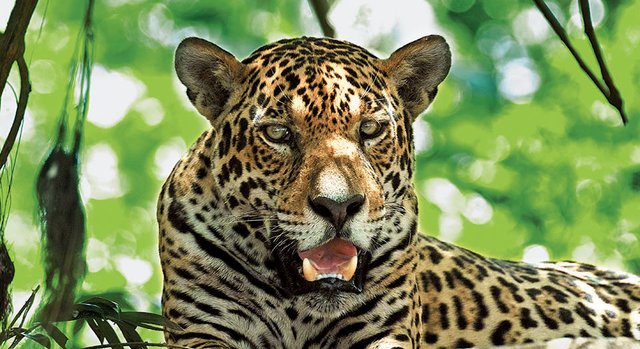
Ecologists point out that there are much better means of securing our borders that don't come at the expense of the environment. There are ways to crack down on illegal crossings while maintaining our ecosystems.
“Aerial surveillance in areas known for their high density of illegal crossings can be simply achieved by placing thermal cameras on the top of high poles, and working to shorten Border Patrol response times. You can also increase Border Patrol presence in areas where at the moment little exists, and all for a far lower price tag than a border wall, and with no damage to the local ecosystem.” - Professor Ceballos Source
Even border patrol agents point out that a wall is unlikely to actually curb the number of immigrants entering the country illegally.
“They are always finding new ways to cross, and a five-meter wall isn’t going to pose much of a barrier to someone fleeing the gangsters in Guatemala.” Source
“When we catch illegal immigrants, they go to detention centers where their pleas for asylum mean 90 percent remain in the U.S. anyway." Source
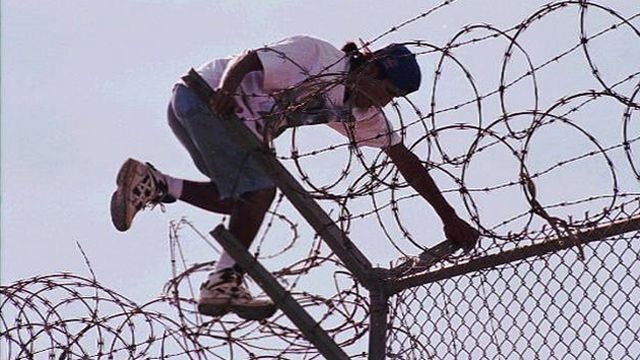
So now we are talking about a wall that:
1. Will probably not curb the immigration of illegal immigrants
2. Is far less effective AND profoundly more expensive than other means of border security
3. Will have an immensely negative impact on the local ecosystem and could drive hundreds of species to extinction
We have to investigate other means of securing our borders (if that's really what we want to do anyway). While a wall is a symbolically nice thought to some Americans, it comes with a huge price tag at the expense of citizens and our ecosystem. Besides being ineffective and expensive, it is, simply put, an ecological disaster. We have to recognize that "protecting America's interests" also means protecting our environment and natural resources. In that regard, a border wall would be a miserable failure.
Article Link: http://www.foxnews.com/world/2017/04/10/experts-warn-800-species-many-endangered-affected-by-border-wall.html
Nice complex article that has earned my up vote (for what it’s worth :D). Nevertheless any sane human being knows that building such a wall is one of the stupidest ideas that went viral in past few months.
Thank you! For the sake of people's feelings or beliefs I won't call the wall (or the people who support it) stupid; I understand people do feel their security at risk and a wall is a nice thought in theory. However, between the financial, political and environmental impacts, just to name a few, there is definitely little upside to the whole proposal. But again, much of that is just due to misconceptions about what the wall actually would or would not do. Hopefully these sorts of studies alert people to the facts that, while the symbolism of a wall may make them feel safer, it really does more harm than good.
Forgive my harsh statement. It´s just, I would expect people to know already that walls were useful against arrows and swords and that age is long gone. In this age “battlefield” is composed of completely different essences. I don´t want to get to political since the message of your article lies elsewhere and I´m gonna respect that :). Keep up the good work! Peace
No worries, no offense taken! In my line of work I have to maintain a sense of political neutrality and that has definitely transferred over to my personal life. Even if I disagree with something, I'll do my best to at least understand where the other side is coming from...even if I'm quietly raging inside (the wall definitely sets me off). But I wouldn't have posted this if I didn't expect some political debate lol. Thanks for your comments and support!
The alternative is not better. If we become Mexico, and do away with all environmental regulations, then the environmental catastrophe that is now gripping the third world will be here too. (see China's pollution problems) There are better ideas than a wall, but too many people would cry.
Well we already seem to be stripping away our environmental policies and regulations. But I'm not advocating for doing away with the border entirely. As it stands, I think our current border would work just fine with some improvements like those mentioned above. The wall would just be too drastic a change for the ecosystem to handle. The point here wasn't that we should open our borders or do away with them, but perhaps maintain them in such a way we protect our resources. We can find a nice middle ground without having to resort to extreme conclusions.
We could solve the problem satisfactorily if we stop welfare for immigration criminals, cease to recognize anchor babies as citizens, defund sanctuary cities entirely, and deport the 30 plus million that are here already. We wouldn't even need a fence.
I won't get into the politics of it but yes, there are a host of policies we could turn to to solve the problem depending on your political stance and the extent to which we want to financially and physically enforce them. This post is not meant to say exactly how we have to go about tackling the issue, but is simply meant to inform people on some of the lesser known impacts a border wall would have (since the wall is currently the tactic the administration seems most in favor of). Again, I'm not saying we should give up on national security, that would be absurd, but we do need to consider our natural resources.
The Alaska pipeline had to be modified to allow for the animal migrations. I guess we could study how the great wall of China has affected local species populations. A fifty foot plus wall across an entire continent seems absurd, but Australia put up the rabbit fence, and also the dog fence.
I think with all the new infrastructure (pipelines, walls, dams, etc) we need to be more mindful of ecological impact, and the border wall is no different. But you raise a interesting point about China's wall; I'd love to see a study about how the wall's construction impacted local ecology! I think we can obtain a solution that is ensures both border security and environmental welbeing!
Unintended effects of projects on this scale are known to occur frequently. Dams affect the actual spin of the Earth, from season to season. They also affect the gravity distribution by concentrating mass in places other than where it would naturally collect. In addition, the added evaporation in areas which would normally be well drained affect plant life, and from there animal life. The prevalence of water alters the electrical conductivity of the Earth increasing lightning, and from there local atmospheric ozone content. It is amazing all the different changes that can be brought about from small changes, let alone the large scale cascades of changes caused by projects on the scale of walling off a continent. I don't think I could even begin to guess what the environmental impact assessment, for a 2000 mile wall, would entail, but I'm almost certain it would suffer from unknown unknowns, no matter how thorough.
Absolutely, well said!
I've posted on Facebook about this very thing. The US jaguar population is probably the most dire, and there are many, many other species that would be harmed by this border wall. I feel that because everybody is so up in arms about the social consequences (good or bad, left or right) that this issue is going by the wayside in people's minds. I'm not saying that animals are more important than humans, but I do agree with this statement of yours:
So often with political debates (including this one), people seem to think there is no middle ground. In other words, people only think win-lose, not win-win, and it drives me crazy. My argument is that if humans are smart enough to put a man on the moon, we can figure out a way to solve problems like these easily!
Mexico is so poor they barely enforce their wildlife laws. Corrupt and poor. Yes I been their many times on the border. Make America Third World Again? If America becomes Mexico you can count on that wildlife would be last priority.
Well our own environmental policies are beginning to slip, but I'm not saying we should "become" Mexico or adopt their strategies (I hope I didn't come off that way; if I did, my mistake). The point of this article is to alert people to the potential downfalls of this one particular proposal for border security, not to say we should abandon the border security altogether. We can protect our border, but if we want to protect our natural resources, we need to adopt a different strategy.
I am just saying that 3rd world countries like Mexico don't protect their wildlife very well. That the thing with this liberal agenda is that once a country becomes poor EPA or wildlife laws will not matter anymore b/c people are desperate. Hopefully, the blockchain will help change this allowing economic freedom across the world like we have never seen before but until then, until these countries clean up their act a big fat tall wall should rise up to keep the illegals and drugs out. People don't won't their problems here. This is one a fundamental reasons why Trump had some support. They want a big fat wall to send them a message to stay the hell out unless they come in legally like the rest of us did.
Okay, I hear what you are saying. But we are not a 3rd world country, and we DO have the capability (and I feel obligation) to protect our environment. Again, I am all for border security. I completely recognize it as an absolute necessity. That being said, there are other methods that will not only keep people out more effectively, but will also cost less and protect natural resources. So if there is a way to increase security while protecting the environment, wouldn't that be preferable? Isn't that what a 1st world country would do? Like I said, I'm not trying to tell you we should completely open or do away with our borders, I'm just trying to point out the ecological pitfalls of a wall, and hopefully show there are other effective means of security.
We don't have to choose between security and ecological welfare, there are solutions that allow us both!
There aren't that many good ways of securing that border. The wall won't work, they'll tunnel like rats. From both sides. And harming the wildlife shouldn't be an option but we don't know what a good option is. The flow of drugs from mexico has to stop though. Illegals aside, the drugs are destroying the communities in the bordering states. And from Mexico's end, guns are entering Mexico from the States, fuelling their cartel war.
It's true, border security is a more complex issue than many people believe/want to accept. That's why the idea of a wall is so appealing. What better symbol of safety and security than a giant concrete wall? But we need to be focused on finding the BEST solution (in terms of actually securing the border, expenses, environmental impact, etc). I would like to believe it is possible to improve security without sacrificing our natural resources. Can we ever 100% secure the border? Not likely, but I think we can reasonably cut down on illegal crossings without a giant wall across the continent.